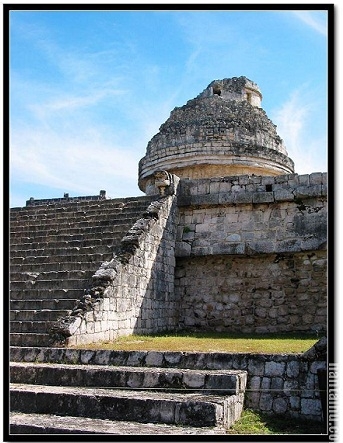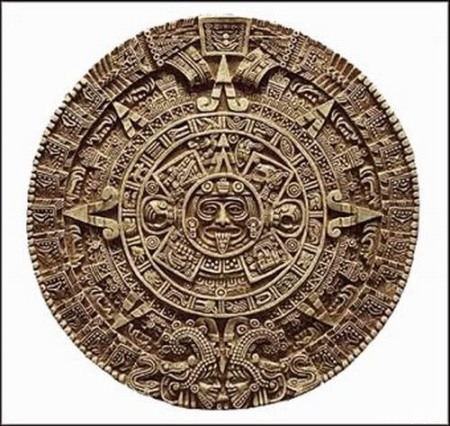
THE world is definitely not coming to an end today, the winter solstice.
世界絕對(duì)不是在今天冬至日走向終結(jié)。
Jesús Galindo Trejo, a Mexican researcher in astro-archeology, plasma astrophysics and solar physics, answers questions about the end-of-the-world prediction and the Mayan calendar, which ends today. He recently addressed a conference last month at Shanghai Tonji University.
Jesús Galindo Trejo,一個(gè)研究天文考古學(xué)、等離子體物理、天體物理學(xué)的墨西哥人,回答關(guān)于世界末日預(yù)言和瑪雅歷法的問(wèn)題,即今天是末日。他上個(gè)月最近的一次會(huì)議發(fā)言是在上海同濟(jì)大學(xué)。
Q: Are there any threats to Earth in 2012?
問(wèn):2012年會(huì)有什么威脅到地球嗎?
A: The only real threat to Earth is the irresponsible conduct of man in the contamination of our planet. The probability of an impact of a meteorite or comet on Earth is so low that the most dangerous situation comes from our own star, the sun billions of years hence. According to the stellar evolution theory, in approximately 4.5 billion years, the sun will become a giant red star, its distance to Earth will shrink, all liquids will evaporate, and possibly the sun will absorb Earth. Then we will return to our origin. In 2012 there is nothing dangerous for Earth.
答:唯一真正威脅地球的是在污染我們星球方面人類不負(fù)責(zé)任的行為。隕石和彗星影響地球的概率是如此之低,以至于最危險(xiǎn)的處境來(lái)自我們自己的星球,在太陽(yáng)幾十億年之后。根據(jù)恒星演化理論,在大約45億年之后,太陽(yáng)將變成一個(gè)巨大的紅色星球,它和地球的距離會(huì)縮小,所有的液體會(huì)蒸發(fā)掉,可能太陽(yáng)會(huì)吞噬地球。然后我們將返回到我們的起源。2012年對(duì)地球來(lái)說(shuō)沒(méi)什么危險(xiǎn)。
Q: What's the origin of the prediction that the world will end in 2012?
問(wèn):什么是2012年世界末日預(yù)言的起源?
A: The so-called Mayan predictions are simply a rough extrapolation of a cultural theme from this prehispanic people. The origin of this assertion is a characteristic of the Mayan calendar, for which the date of this winter solstice could be written as 13.0.0.0.0. Some enthusiastic people in the United States think that this striking date must necessarily imply a mysterious message. They invented some prophecies that from the point of view of Mayan astronomy and culture are simply nonsense.
答:所謂的瑪雅預(yù)言只是來(lái)自史前人類的一個(gè)文化主題的粗略推斷。這種說(shuō)法的起源是瑪雅歷法的特點(diǎn),冬至的日期可以寫成13.0.0.0.0。一些好奇的美國(guó)人認(rèn)為這個(gè)引人注目的日期必須必然意味著一個(gè)神秘的消息。他們從瑪雅天文學(xué)和文化的角度創(chuàng)造的一些預(yù)言根本是無(wú)稽之談。

Q: Does the Mayan calendar end in December 2012?
問(wèn):瑪雅歷法是在2012年12月結(jié)束嗎?
A: The Mayan calendar is an endless system. This situation is very similar to that in the year 2000. The next day after the winter solstice, the Mayans would have written the date as 13.0.0.0.1, and so on.
答:瑪雅歷法是一個(gè)無(wú)盡的系統(tǒng)。這種情況非常類似于2000年。冬至后第二天,瑪雅人將會(huì)把日期寫成13 0 0 0 1,等等。
Q: Why does the Mayan calendar indicate a world end in 2012? Mayan astronomers were accurate in other planetary predictions.
問(wèn):為什么瑪雅日歷會(huì)暗示世界在2012年終結(jié)呢?瑪雅天文學(xué)家在其他行星方面都是預(yù)測(cè)準(zhǔn)確的。
A: Mayan astronomy made significant achievements. For example, the determination of the synodic period of Venus, the computation of solar eclipses and the commensurability of the Venusian and solar observational periods. However, the Mayans did not say anything about the end of the world. This assertion is a foolish modern over-interpretation, which shows ignorance of the Mayan culture.
答:瑪雅天文學(xué)取得顯著成就。例如,確定金星的會(huì)和周期,計(jì)算日食和金星的公度以及太陽(yáng)的觀測(cè)周期。然而,瑪雅人沒(méi)有說(shuō)任何關(guān)于世界末日的事。這種斷言是一種愚蠢的現(xiàn)代深意,它顯示了對(duì)瑪雅文化的無(wú)知。
Q: How do you, as a senior researcher in cultural astronomy, feel about claims of the world ending in 2012?
問(wèn): 作為一個(gè)文化天文學(xué)的高級(jí)研究員,你如何看待2012年世界末日的斷言呢?
A: This global social and media phenomenon is typical sign of the times. People are tired of crises, religion and so on, and they look for new emotions. What triggers emotion in people? Phantoms, the end of the world, and other mysterious or catastrophic events.
答:這個(gè)全球社會(huì)和媒體的現(xiàn)象是典型的時(shí)代征兆。人們已經(jīng)厭倦了危機(jī)、宗教等等,他們尋求新的情感寄托。是什么觸發(fā)了人們的情感呢?幻影,世界末日,以及其他神秘的或?yàn)?zāi)難性的事件。
Jesús Galindo Trejo has been a researcher for 20 years at the Astronomical Institute of the National Autonomous University of Mexico in Mexico City. He specializes in the archeo-astronomy of prehispanic Mexico and studies the influence of astronomy in ancient and contemporary cultures.
Jesús Galindo Trejo已經(jīng)在墨西哥城的墨西哥國(guó)立自治大學(xué)天文研究所做了20年的研究員。他專于墨西哥特奧蒂瓦坎古城的考古天文學(xué),以及研究天文學(xué)在古代和當(dāng)代文化中的影響。




